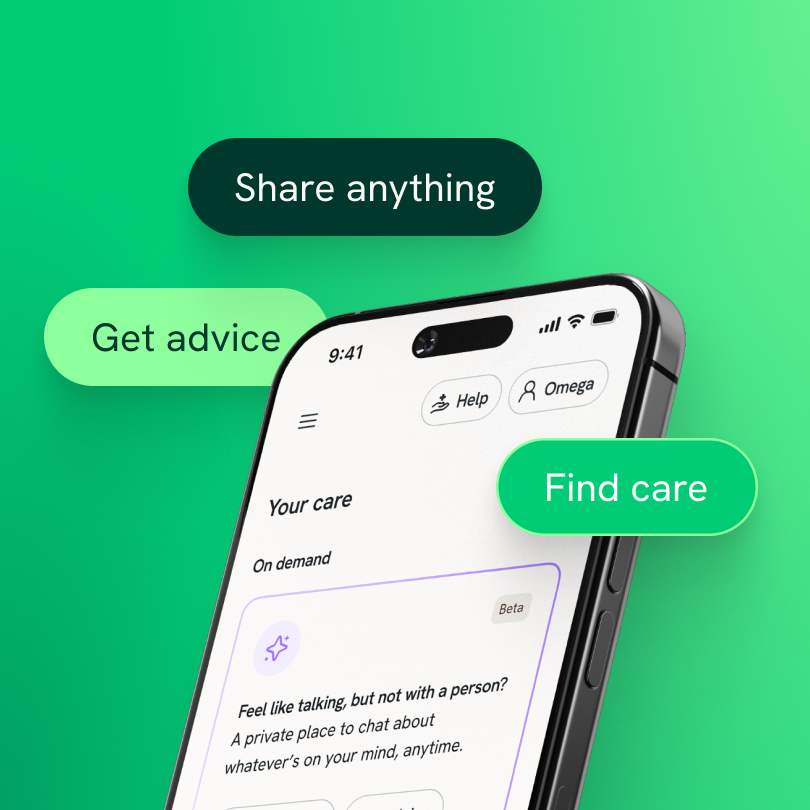AI is everywhere—from how we work to how we shop, learn, and connect. But when it comes to mental health, speed and automation alone aren’t enough.
Caring for someone through a tough moment or helping them stay committed to therapy requires more than a chatbot. It takes empathy, trust, privacy, insight, and a real understanding of what they’re going through.
At Spring Health, we believe AI should support that kind of care, not replace it.
That belief is at the core of our Ethical AI Framework: a transparent, principled approach to building and using AI in mental health care. It’s grounded in science, shaped by clinical expertise, and guided by five commitments—consent, privacy, safety, continuous learning, and access.
Now, we’re putting those principles into practice. Our latest innovations are designed to reduce friction, personalize care, and improve outcomes, while always preserving the human connection at the heart of healing.
For HR leaders focused on employee wellbeing and ROI, the message is clear: this isn’t AI for the sake of innovation. It’s AI that makes care work better for everyone.
Why AI in mental health care needs a human-centered redesign
Mental healthcare isn’t one-size-fits-all, and it’s never just about speed or scale. It’s personal, vulnerable, and often complex. That’s why AI in this space can’t just follow the rules of productivity tech. It has to be built differently.
But the system is still falling short. Not because people don’t care, but because they’re up against too many barriers:
- Providers are overwhelmed. 85% say administrative tasks like documentation and paperwork interfere with patient care
- Members face too many drop-off points. More than 1 in 5 people stop treatment before they start to feel better, often due to delays, poor provider fit, or confusing onboarding experiences
- HR leaders need better visibility. 64% say their mental health benefits data isn’t actionable enough to inform investment decisions or prove ROI
These aren’t just operational challenges—they’re real human pain points. And they ripple outward: delayed progress, disengagement, and missed chances to truly help someone feel better.
That’s why Spring Health takes a different approach. We’re designing AI intentionally—to reduce friction, close care gaps, and improve mental healthcare for everyone it touches. When mental health AI is built on ethics, guided by clinicians, and centered on people, it becomes a tool for healing, not a substitute for it.
How AI is improving the member care experience
We’re using AI to make the Spring Health experience smoother, more personal, and more effective without ever losing the human touch.
Here’s how that innovation will show up for members throughout 2025.
1. Guided pre-appointment intake
Helping members start care with confidence
Taking the first step toward care can feel overwhelming. For many people, just getting started is what holds them back.
Our AI-powered intake helps ease that moment. Before their first session, members can reflect on what’s bringing them to care, share past experiences, and add relevant health history—all in their own words, on their own time.
That insight is securely shared with their provider through Spring Health’s electronic health record so that sessions can begin with more understanding, not more intake questions. Providers can start building trust and connection faster.
If a member ever switches providers, their story moves with them, so they never have to start from scratch. For HR leaders, that means higher-quality engagement from the very first session.
2. Session summaries, takeaways, and automated journaling
Helping progress continue between sessions
Therapy and coaching don’t end when a session does. But life gets busy, and it’s easy for insights to fade or momentum to stall between appointments.
Sessions can be securely recorded and summarized using AI with consent from the provider and the member. These clear, personalized recaps include key takeaways—like journaling prompts or reminders to practice a CBT skill—and are saved in the “My Care” section of the Spring Health app.
Members can revisit them anytime, helping them stay connected to their goals and progress. Providers can disable the feature at any time based on clinical judgment.
This small support can make a big difference—reinforcing insights, encouraging follow-through, and helping care stay active between sessions.
3. In-the-moment conversations
Real-time support, whenever it’s needed
Mental health doesn’t follow a schedule. Sometimes, someone just needs a safe space to pause, reflect, or reset, especially outside scheduled sessions.
Our in-the-moment AI conversations are available 24/7 to help members work through emotions, make sense of a tough interaction, or access guided support tools. These conversations are always non-diagnostic and never meant to replace human care, but they can offer comfort, clarity, and connection in the moment.
If additional support is needed, the AI can escalate the conversation to a licensed clinician. With the member’s consent, a high-level summary is shared with their provider, creating continuity and deeper context for ongoing care.
It’s one more way we’re helping people feel supported—anytime, anywhere.
Early results show higher engagement, satisfaction, and safety
Before rolling these features out more broadly, we’re testing them with study participants to ensure they’re truly helping and truly safe.
So far, the results are promising:
- 95% of members say they’re satisfied with the AI-powered tools
- Around 70% report feeling better after using them
- Zero safety issues, thanks to real-time escalation protocols that bring licensed clinicians in when needed
Every AI experience is built on consent, monitored continuously, and governed by our internal AI Governance Board—a cross-functional team of clinical, legal, and data security experts. Our models are trained on real-world data, shaped by clinical insight, and designed to support members with safe, high-quality care that makes a real difference.
For HR leaders, smarter benefits that show real outcomes
When employees feel better, the impact reaches every part of the organization faster. But HR leaders also need to know that their investment drives results, especially in a climate of tight budgets and rising expectations.
These AI-powered tools make mental health care:
- More accessible by removing friction at the start
- More continuous support between and beyond sessions
- More measurable by generating meaningful data that connects engagement to outcomes
This isn’t about hype or headlines. It’s about smart, human-centered innovation designed to make care more effective, sustainable, and impactful for every employee.
See ethical AI in action
These tools are part of our long-term commitment to improving care through clinically sound, trustworthy AI.
At Spring Health, every AI interaction is grounded in research, guided by clinical and ethical experts, and governed by our AI Advisory Council—a group of global leaders, customers, and clinicians. Every feature is consent-based, continuously monitored, and built to support, not replace, the human connection at the heart of mental health care.
Watch the video to see how thoughtful AI and compassionate care come together to support people through the moments that matter most.






.png)










.jpg)
.jpg)


















